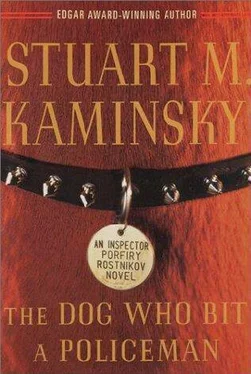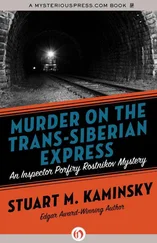Stuart Kaminsky - The Dog Who Bit a Policeman
Здесь есть возможность читать онлайн «Stuart Kaminsky - The Dog Who Bit a Policeman» весь текст электронной книги совершенно бесплатно (целиком полную версию без сокращений). В некоторых случаях можно слушать аудио, скачать через торрент в формате fb2 и присутствует краткое содержание. Жанр: Полицейский детектив, на русском языке. Описание произведения, (предисловие) а так же отзывы посетителей доступны на портале библиотеки ЛибКат.
- Название:The Dog Who Bit a Policeman
- Автор:
- Жанр:
- Год:неизвестен
- ISBN:нет данных
- Рейтинг книги:3 / 5. Голосов: 1
-
Избранное:Добавить в избранное
- Отзывы:
-
Ваша оценка:
- 60
- 1
- 2
- 3
- 4
- 5
The Dog Who Bit a Policeman: краткое содержание, описание и аннотация
Предлагаем к чтению аннотацию, описание, краткое содержание или предисловие (зависит от того, что написал сам автор книги «The Dog Who Bit a Policeman»). Если вы не нашли необходимую информацию о книге — напишите в комментариях, мы постараемся отыскать её.
The Dog Who Bit a Policeman — читать онлайн бесплатно полную книгу (весь текст) целиком
Ниже представлен текст книги, разбитый по страницам. Система сохранения места последней прочитанной страницы, позволяет с удобством читать онлайн бесплатно книгу «The Dog Who Bit a Policeman», без необходимости каждый раз заново искать на чём Вы остановились. Поставьте закладку, и сможете в любой момент перейти на страницу, на которой закончили чтение.
Интервал:
Закладка:
She was wearing a simple blue dress with a wide black patent-leather belt. The young woman approached the bed. Rostnikov remained at the door.
“They say you will be fine,” the young woman said, standing next to Elena’s bed. “I’m sorry I didn’t tell Inspector Rostnikov sooner.”
“You saved my life,” said Elena, taking the woman’s hand with her good one.
“I must go,” the young woman said, smiling and backing away from the bed.
“Your name,” said Elena, now fighting sleep.
“Svetlana,” the young woman said. “Sleep.”
Svetlana left the room, closing the door, and Rostnikov moved to Elena’s bedside.
“Yaklovev is her uncle,” said Rostnikov. “She is very valuable to him, and to us. Also, I like her.”
“So. . do. . I,” Elena managed to say as she was falling asleep. “I have reason to.”
“Rest,” said Rostnikov, who touched the bed and went through the door in search of a phone and Leon.
The small reception room with three comfortable chairs and a desk was empty. Leon had a part-time receptionist/nurse, but Rostnikov had not seen her today.
The phone was on the desk. He reached for it and saw Leon’s appointment book open to today. As he placed his call, Rostnikov glanced at the appointment book and read the upside-down name: Sarah . No last name.
Rostnikov got his call through and discovered from the man he had left at the hotel that Sasha was fine, that the plan had worked, and that the meeting was set for tonight before the scheduled battle of the dogs. Sasha had managed to give the man that much information and no more.
Porfiry Petrovich’s plan had been to return to Petrovka. There was much to do, much to learn. It was early, but days had a dis-comforting way of being over just as they seemed to be beginning. Rostnikov sat in one of the chairs. Normally, he would have read the novel he brought with him, but he had left it with Elena.
He adjusted his leg, rested on the arms of the chair, and fell asleep. He was awakened moments later by the sound of a door opening and the sight of Leon ushering out a very well dressed woman in her forties. She looked as if she had just stepped out of one of the new salons after visiting a tasteful but expensive clothing shop.
The woman, well groomed but plain in spite of her makeup, smiled at Leon and thanked him.
“It will be fine, Marianskaya,” he said, taking her hand and leading her to the door next to Rostnikov.
She looked down at the block of a man seated awkwardly and then allowed herself to be ushered out.
“People like that pay the bills,” said Leon, turning to Rostnikov after he had closed the door.
“You owe me no explanation,” said Rostnikov.
“I know, but why is it that I feel I do?”
“A little guilt?” asked Rostnikov, rubbing his face into a semblance of wakefulness.
“Perhaps. Yes.”
“You needn’t feel guilt, Leon,” said Rostnikov. “I know the good you do.”
“Yes,” said Leon, sitting in the chair next to Rostnikov and unbuttoning his jacket. “But do I do the good things because I feel guilt for being able to live like this with the huge fees I get from the Marianskayas of Moscow, or do I do it because I am a saint?”
“You are a saint,” Rostnikov said solemnly.
Leon smiled.
“I suppose it is my duty to accept beatification from a distinguished member of the government. I like you, Porfiry Petrovich.”
“I am humbled and honored and I like you .”
“I did not mean to be patronizing,” said Leon. “I’m tired. I have more rich patients coming, some with very little wrong with them, all who want a great deal of my time. I would rather be in my apartment through that door, playing Mozart or even Brahms. I am thinking of getting a harpsichord. Do you like the sound of a harpsichord?”
“I prefer the piano,” said Rostnikov. “Harpsichords remind me of Russians in powdered wigs trying to act like Frenchmen.”
They sat silently in the waiting room chairs for a few seconds and then Leon said, “You saw my appointment book.”
“Yes,” said Rostnikov. “Did you mean me to do so?”
“Perhaps.”
“Sarah is ill.”
“She will tell you,” said Leon.
“You tell me.”
And Leon did, concluding, “I have never lied to Sarah, but I have sometimes not told the complete truth. It is what doctors must do.”
“And policemen,” said Rostnikov.
“The surgeon may have no trouble relieving the pressure on the brain, but the recent tests are troubling. We’re running more tests, but we have scheduled surgery for the day after tomorrow in the morning.”
Rostnikov looked at the ceiling.
“Sarah will be upset that I told you,” said Leon.
“No,” said Rostnikov. “Relieved. Thank you, Leon.”
“You are welcome, Porfiry Petrovich.”
The two men rose.
“It might be a good idea if you had different pants. Those have been badly shredded. I have several pairs of trousers from my late father-in-law,” said Leon. “I think they may fit you.”
“Why not?” said the policeman. “Why not?”
Paulinin had cleared off three tables in his laboratory, no easy task considering the amazing clutter. On one table lay the corpse of the recently murdered Chechin gangster. His hands were at his sides, and an open incision from the center of his ribs to his lower abdomen revealed a jumble of pinkish organs, intestines, and other body parts. On the second table lay the burned corpse from the roof of the apartment building on Kalinin. Its head was missing. On the third table were at least one hundred charred and partly burnt pieces of photographs, segments of cassette tape, and various items gathered by Paulinin from the hotel roof.
Emil Karpo, Iosef Rostnikov, and Akardy Zelach stood watching attentively. Paulinin, they knew, had a passion for exhibiting his skill before small appreciative audiences. Paulinin stood between the two corpses. He wore a blue smock and white latex gloves.
“There is still much to learn here,” he said. “It will take two or three days, maybe less. Had the corpses and this evidence been given to Pariatsok or Mendranov or any of the incompetents who call themselves pathologists and know nothing about careful examination and simple logic, they would have befouled the evidence, come to the wrong conclusions, and allowed the guilty to escape. That does not happen with Paulinin, who has been con-signed to this room for two decades. What they do not know is that I am content here, though I could use more modern equipment.”
None of the three detectives spoke or looked at each other. All three knew that those who knew of Paulinin and his laboratory also knew that he could be happy nowhere else.
“This is definitely the German, Jurgen,” he began, pointing at the blackened, headless corpse. “Teeth, bone structure, size, small hair samples all coincide with his description. I will find more. I will prove it conclusively. You can continue to search for our German, but he will be found nowhere but here in front of you. He was drunk when he died. He was nude when he was burned.
There are no signs of burnt clothing clinging to his bones. His skull was definitely cracked by a heavy wooden object brought down with great force, but that did not kill him. He was also stabbed in the neck, as I noted immediately upon examining the body. Now I know that the small slivers of wood in the skull and the others in the neck are from the same object, almost certainly one that broke upon striking the German’s head.
“Paulinin has changed his mind about one early conclusion. It takes courage in this profession to admit a possible error, even if the error is rectified immediately. There is a definite possibility, perhaps even a likelihood, that the German, while he was killed by the stab wound, may not have been quite dead when his body was burned. Oh, he was certainly dying and would have died, even with immediate expert attention, which is not easy to come by in Moscow and impossible everywhere else in Russia.”
Читать дальшеИнтервал:
Закладка:
Похожие книги на «The Dog Who Bit a Policeman»
Представляем Вашему вниманию похожие книги на «The Dog Who Bit a Policeman» списком для выбора. Мы отобрали схожую по названию и смыслу литературу в надежде предоставить читателям больше вариантов отыскать новые, интересные, ещё непрочитанные произведения.
Обсуждение, отзывы о книге «The Dog Who Bit a Policeman» и просто собственные мнения читателей. Оставьте ваши комментарии, напишите, что Вы думаете о произведении, его смысле или главных героях. Укажите что конкретно понравилось, а что нет, и почему Вы так считаете.












